
Now that I have started, I have decided also to tell the rest of my story.
I had to move into a hotel and was barely settled in when I received a telephone call to ask me to come to the office. They asked me to go to the passenger ship ‘The Johan van Oldenbarnevelt’ to take over the night watch. That night there was a party ashore and it was expected that all the crew would attend. When I arrived there was only one assistant engineer left behind who pointed to the hole of the engine room and said: ‘Everything is OK’ and hurried ashore.
With the sailor of the watch we were the only two persons left on this really colossal ship. The night was long and boring and the following morning everybody took their time to wake up and have breakfast. It was after ten o’clock when I could leave and go to my hotel where I had a good sleep.
The next day I applied for leave, which was granted, and hurried to London where I booked into the ‘Bonnington Hotel’. Considering that I still did not have enough personal belongings I had to get coupons and ration stamps. After getting information from the shipping office I found out where to go. I believe I received the same amount of rations as a citizen of Great Britain received in a whole year.
After getting some money out of my savings account I could buy absolutely everything I needed while at the same time taking care not to burden myself with unnecessary gear. I had learned my lesson. Yet I still got enough for a suitcase full which of course I also had to buy. One has to cart an awful lot around if one has no ship to stay on. That did not last long. Coming back from my leave I was put on a ship called ‘SS Maaskerk’ that was unloading and being repaired in Liverpool, I signed on in January 1943.
I was quite happy that I had now some certainty even though it was a totally strange vessel for me. It carried freight and passengers. Before the war it had been sailing to West Africa
visiting all the ports along the whole coastline of West-Africa. I came aboard with my carefully selected small amount of luggage and after introducing myself was shown to my cabin; a cabin for two persons situated right up top on the boat deck. No portholes but big square windows overlooking part of the boat deck and the wide ocean. A really nice place to stay.
The ship was powered by a steam turbine. A totally different engine room from the diesel engine room in my previous ship. The mess-room was a deception. A cubicle with two tables each for six persons and a pantry, situated at the waterline which required the small portholes to be closed in bad weather. You could not do this to a decent person, particularly in the tropics, because at that time ships were not air-conditioned. In the passenger area there were cabins for about forty passengers with quite a nice saloon that was also used as a dining room.
The ship conducted a regular service to the many islands of the Caribbean; this was in fact a service which had taken over from an English Company which in peacetime ran a three monthly service there.
Because many of these islands were under British rule, there were a lot of civil servants and others who worked in industries and agriculture together with their families. In peacetime this service was very popular. In addition shops, factories and agriculture were supplied by the same ships.
These ships were known for their punctuality regarding their arrival and departure times. During the first few days on board I learned that this punctuality was not always achieved even though the company was aiming for tit. The result was that the ‘Maaskerk’ and the crew were very popular on many islands. ‘Would the ship come?’ And if so ‘What would it carry?’ Regarding the goods on board, you could not mention something or we would have it, from beer to safety pins.
Something new for me was that the crew had formed a soccer club, the ‘Maaskerk Rangers’.
It was formed to satisfy the demand of the local soccer clubs on those islands. On arrival the local clubs were ready with invitations for a game; sometimes invitations came from a warship that was in harbour. That was always ‘Blood on the Post’ because neither side wanted to lose.
After the game everybody was very chummy. The Royal British Navy had its own sporting ground with a canteen where the tremendous thirst saved up by players and spectators was slaked.
On the question about my knowledge of soccer and if I also played I could answer in the affirmative and when I told them I would prefer to be the goalkeeper I was immediately drafted.
I had played as keeper on occasion and considering this I knew it would also be better for my health than running twice for three quarters of an hour in the very tropical heat. That turned out to be a good idea and so it all happened.
I was also informed of the fact that a magazine was produced in which anybody who was so inclined could get rid of his literary inclinations. The magazine was called ‘The Tramp’ and was the club bulletin of the ‘Maaskerk Rangers’. The editor was the third mate (after the war he became an editor of a newspaper in Holland), who also did drawings. It was typed up and copied by the wireless operator. A copy machine was donated by the ‘Dutch Welfare Fund’ which encouraged such activities. Every article ,whether it was sense or nonsense was accepted. Sometimes there were very good articles even some that increased the general knowledge of the readers. Poetry straight and bend, jokes and stories about one’s adventures ashore. Really nice reading. The magazine was always a minimum of four pages of A4 paper, often more.
On top of this there was a radio station for crew and passengers situated in the radio room as it should be. There was a great assortment of records and a record player donated by the Dutch Welfare Fund. The spoken word was presented by the wireless operator and could consist of anything from local news to world news and a call to the crew to write an article for the magazine etc.etc. The passengers appreciated those radio bulletins because they were also given in the English language and gave an insight into the doings of the crew during wartime. The passengers were also part of the ship’s complement. Sometimes a passenger was congratulated with his or her birthday which caused a great surprise since they did not know that this information was supplied by the purser free of charge to the wireless operator. He made every day a type of one-man show. I had never experienced so much social activity on a ship. The driving forces were the third mate and the wireless operator who spent a great deal of their spare time doing this. I must say that I liked it very much.
The ship carried some forty passengers and was always fully booked by Englishmen who for ninety percent had work in the Caribbean. Many were with their wives and some even with their children. I often asked myself if there was not a safer way of travelling.
At departure one was never sure whether one would reach one’s destination. The slaughter of merchant ships and their crew was disastrous since the start of the war and the allies did not seem to have an answer for the attacks of the U-Boats. Yet the ship was always fully booked, both coming and going. Fully loaded the ship was safely crossing the Atlantic Ocean in convoy twice every three months and had been doing so for two years. The population of the Caribbeans always spoke about the ship in two words ‘Lucky Maaskerk’.
The sailing was very dangerous upto and including 1943. A few times we had no difficulties during a crossing but most of the time our convoy was attacked. The German Navy was not standing still and had switched for some time to attacking with a group of U-Boats at the same time, the so called ‘Wolfpacks’. If one U-Boat sighted a convoy it would signal the position and follow the convoy. Headquarters in Germany would then direct the closest boats usually, between 10 and 20, to the convoy giving the command of this Wolfpack to the most senior captain. They operated mostly at night because the Navy escorts of the convoy would chase them so closely that they had no time to do any torpedoing. This tactic proved murderous. Often more than one ship would be torpedoed. A few times we took survivors on board. Sometimes we even took the Commodore of the convoy on board.
When sailing in the’Abbekerk’ we sailed on our own at our top speed and as such never had any problems with exploding depth charges from the escorting warships who were hunting the U-Boats. On the ‘Abbekerk’ one did not know whether there were any U-Boats about. Sailing in convoy was a different matter. In the engine room which was situated under the waterline, the sounds of the explosions of depth charges and torpedoes was clearly heard and was really scary. It reminded one that one’s life was under constant threat during the entire night.
And it was so many nights in a row. I presume that everybody had his own way of dealing with this. I know for sure that after each night I was dead tired and totally parched requiring large amounts of water.
The end of the voyage was always Georgetown, situated on the coast of what was then British Guyana. The ship always stayed there longer because of the amount of cargo to be both unloaded and loaded. This very nice town, where the many Dutch place names reminded us of the times when the Dutch or rather the Zeelanders were wielding power there, had more or less adopted us. That was evident from the number of invitations we received for soccer games and jolly get- togethers at the soccer club’s canteen with an improvised dance floor. Both sides were always pleased when we arrived and somewhat sad when we left.
During one of our voyages to England an escorting submarine chaser started to run out of fuel and would have to leave the convoy and return to Newfoundland to replenish its fuel supply.
The convoy could really not do without this ship and the Commodore asked for volunteers from ships with fuel to spare which were willing to let the Sub chaser have this fuel. Our Captain had a meeting with the chief engineer and decided to give it a go. Both ships were directed to the back of the convoy and to halve their speed .After elaborate precautions a boatswain chair was rigged outside at the height of the fuel-line connection and this was manned by the third and fourth engineers. Both were tied to the rail of the ship, a couple of metres higher. Some spanners and a hammer were tied to their belts. In the meantime the chaser had closed up to about forty meters distance from our ship. A thin line, called a ‘keesje’, was thrown across and onto this a thicker line and finally the oil line was pulled across by us and fastened to our fuel connection. Then we were pumping as fast as we could because slowly but surely the distance between us and our convoy was increasing. It was a pleasure to watch the way the chaser kept station with our ship!
According to me this fuel transfer was unique as I had never heard of this before or after.
We had about twenty girls on board as passengers from the Caribbean islands who had volunteered for service in England. Of course they were all watching the transfer.
I believe they had even woken up the sleeping on board the chaser to watch our girls. Having finished the transfer we went full steam after the convoy and took up our position, and the Commodore gave us his enthusiastic thanks.
On this same voyage one of the girls suffered an acute appendicitis. The ship’s doctor advised that an operation was necessary. We asked and received permission from the Commodore to sail behind the convoy and to turn the ship into the oncoming waves to reduce the ships movement to assist the doctor to stay on his feet which of course is the first requirement for a successful operation. In the big saloon we hung several bed sheets partly to stop dirt and dust and partly to prevent any onlookers. The third engineer rigged up some large lamps normally used in the holds. These lamps were about the same size as those normally used in operating theatres. Everything looked the part, very impressive! The operation was entirely successful. On arrival in Liverpool the patient could walk ashore under her own steam.
Halfway during 1943 the position of the Allied forces improved. The convoys were now protected by aircraft carriers whose planes also operated at night. In addition, the U-Boats were intercepted when they left their ports. Search and destroy equipment had much improved and some U-Boats had to return or were destroyed before they could even sight a convoy. This was much to the satisfaction of the crews of the Merchant Navies.
On 5th May 1945 it was all over. It had been more than enough.
It was not until March 1946 that I returned in the ‘Maaskerk’ to the Netherlands where
I had left on 2nd February 1940 with the’Abbekerk’ For just one voyage, it took six years to come back.
Of the Dutch Merchant ships that took part in the war 387 were lost with the lives of 3600 crew.
The Story is translated from Dutch to English by Ben van Essen in Adelaide Australia
<< previous chapter ——————————————————————-next chapter >>

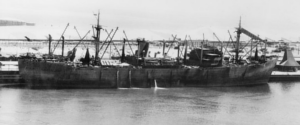
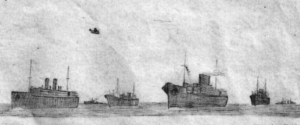
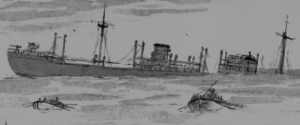
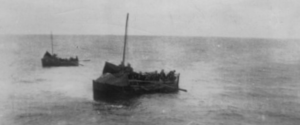
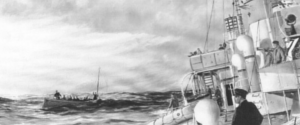
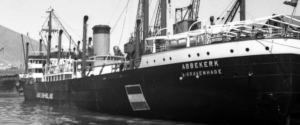



I live in the past as an historian story an historian and I Thoroughly enjoyed this tale.